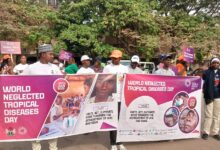WHO Decries Drop In Blood Donation, Encourages More Participation

The World Health Organisation has decried the notable decrease in blood donation due to the Covid-19 pandemic.
Dr Matshidiso Moeti, WHO Regional Director for Africa stated this yesterday in her message commemorating this year’s Blood Donor Day.
TheFact Nigeria gathered that World Blood Donor Day is commemorated every 14th of June, to raise awareness of the need for safe blood and blood products, like plasma.
She explained that this year’s theme was tagged “Give blood and keep the world beating” because fewer people had been donating blood during the COVID-19 pandemic.
“There are still around seven million patients who require this life-saving product in African countries every year.
“Safe blood and its transfusion are key aspects in providing quality care to save mothers haemorrhaging during childbirth and people with serious injuries.
“Blood is needed for surgical procedures, as well as to treat severe anaemia, inherited blood disorders, and other conditions,” said Dr. Moeti.
She also disclosed that blood stocks decreased in the African Region over the past year as movement restrictions and fears of infection hindered people from accessing donation sites.
According to the WHO, the average blood donation rate dropped by 17% and the frequency of blood drives reduced by 25%.
Demand for blood also decreased by 13% with the suspension of routine surgeries in some countries and fewer people seeking care in health facilities.
She revealed that the WHO was working with a range of stakeholders to improve access to quality blood supplies.
This included partnering with the Coalition of Blood for Africa (CoBA), engaging the Organisation of African First Ladies for Development (OAFLAD) and the private sector.
She also disclosed its partnership with Facebook to set-up a Regional Blood Donations feature, which connects people with nearby blood banks.
This tool she said is currently live in 12 countries and over 3.8 million Facebook users have signed-up to be notified of blood donation opportunities.
The Organisation said through this, it was encouraging more young people to donate blood to save lives and to inspire their peers and families to do so too.
Therefore, it urged governments, in collaboration with blood donor associations and nongovernmental organisations, to put in place the systems and infrastructure needed to increase the collection of blood from voluntary donors.
In her closing remarks, she thanked all those who had donated blood and encouraged everyone to give this life-saving gift.
“This day is also an opportunity to thank and appreciate voluntary, unpaid blood donors for this life-saving gift,” she said.






